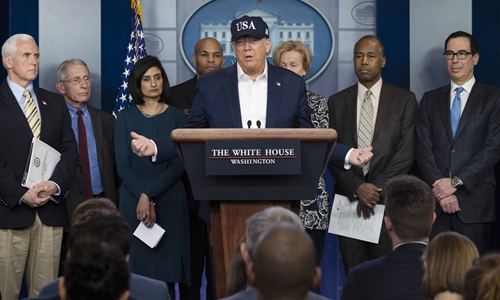HOME >> OPINION
US lacks responsibility of a superpower in face of pandemic
Source:Global Times Published: 2020/3/16 18:33:40

US President Donald Trump gives a press briefing about the COVID-19 alongside members of the Coronavirus Task Force in the Brady Press Briefing Room at the White House in Washington DC on Saturday. Photo: AFP
When the world faces a crisis like the COVID-19 pandemic, the World Health Organization (WHO) is supposed to lead and coordinate epidemic prevention around the world. However, the WHO has been trapped in a dilemma, preventing it from uniting a worldwide fight against the virus.
The WHO has spoken highly of China which has made tremendous efforts in battling COVID-19. The agency's remarks on China's efforts have been positive and objective, reflecting China's proactive approach in fulfilling its responsibilities as a great power. The combination of in-country efforts and international praise has improved China's image abroad. But this is not sitting well with Western countries, particularly the US.
The West has been engaged in nit-picking criticisms of China, and has hoped the WHO would join in and help slander the Asian giant. The WHO's recent comments in support of China are contrary to the expectations of some Western countries, and are hence regarded as "biased." Washington's groundless criticizing of the WHO is actually an extension of the US' strategy against China.
The WHO has made substantial contributions and achievements in helping countries with epidemic prevention over the past few years, including making people aware of the importance of preventing infectious diseases. But a problem with the agency's structure has limited it from playing a bigger role. The WHO can give suggestions to countries about what they should do, but it has no power to require them to change measures they have implemented.
The US is the world's most powerful country, and also one of the 196 signatories to WHO's International Health Regulations. But it has instituted travel restrictions against people in China and Europe, against the advice of the WHO. Washington's attitude has instigated other countries to issue travel bans. The WHO has issued several advisories since January cautioning that international travel bans are unlikely to stop the spread of the coronavirus, but more than 70 countries and regions have adopted limits on travel.
The Trump administration cut funding for healthcare in its 2021 budget proposal and halved its annual funding to the WHO from nearly $123 million to under just $58 million. US President Donald Trump is not a fan of multilateralism, and he has made that well known by pulling the US out of international organizations. By halving its annual funding to the WHO, Washington is providing another example that it doesn't want to fulfill its international responsibilities as a superpower. By doing so, the US conveyed a message to the world - every country is on its own during the pandemic, which is again contrary to the advice of the WHO.
As a leader and coordinator, the WHO can only function well if it has the support of all countries. And this is the win-win formula not only for the UN agency but for all countries. Otherwise, the world will fall into a vicious circle as it faces this public health emergency. As Foreign Policy magazine put it, "a global threat anywhere is a global threat everywhere."
The US has undoubtedly set a bad example in this crucial period when the entire world is faced with the challenge of epidemic prevention, fanning the flames that lead to a lack of solidarity. This is not good for countries in the shadow of the COVID-19.
After Trump declared a national emergency Friday afternoon, US House of Representatives passed legislation authorizing a response to the spread of COVID-19 on Saturday. This will help the US tackle COVID-19 epidemic.
But these measures are mainly domestic. There is still no signal that the US is willing to help the world battle COVID-19. In this respect, the US cannot be compared to China.
The article was compiled by Global Times reporter Xu Hailin based on an interview with Li Haidong, a professor with Institute of International Relations at China Foreign Affairs University. opinion@globaltimes.com.cn
Posted in: VIEWPOINT